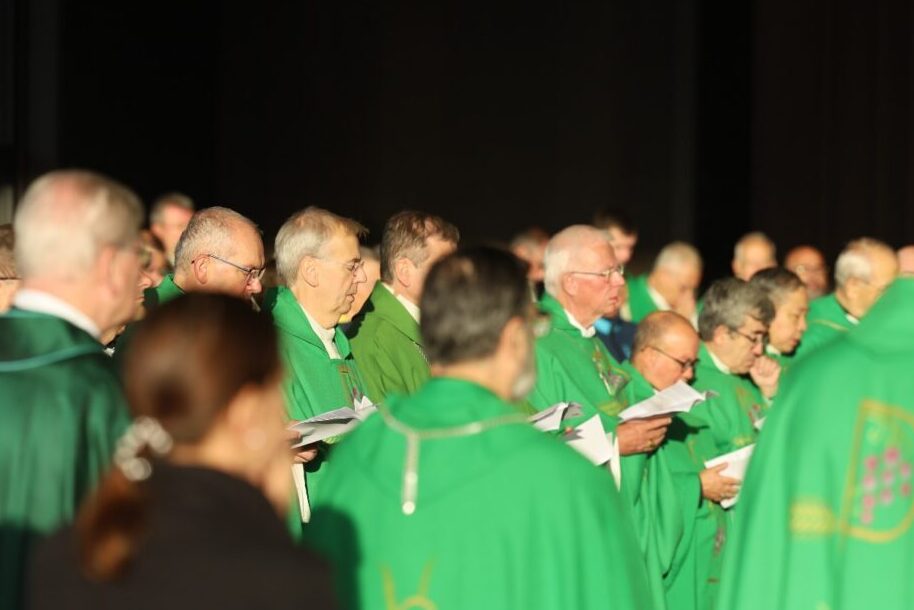
The CCEE Plenary Assembly opened on Tuesday, 7 October, with a solemn Holy Mass in the Basilica of Our Lady of the Rosary, presided by Msgr José Ornelas Carvalho, SCI, Bishop of Leiria-Fátima and President of the Portuguese Bishops’ Conference. At the end of the celebration, the Presidents of the Bishops’ Conferences of Europe entrusted their mission and the continent to the Blessed Virgin Mary through the Act of Consecration. The Maltese Episcopal Conference was represented by its President, Archbishop Charles Scicluna.
The following day, Wednesday, 8 October, the Assembly commenced with Holy Mass celebrated in the Chapel of the Apparitions presided by CCEE President Mgr Gintaras Grušas. In his homily, he recalled Our Lady of Fatima’s promise: “In the end my Immaculate Heart will triumph”, which assures “the conversion from pessimism to hope, from resentment to mercy and from fear to trust”.
After the welcome greetings by Bishop Carvalho, SCI, and Rev. Carlos Manuel Pedrosa Cabecinhas, Rector of the Shrine of Fátima, the working sessions were opened by the inaugural address of Archbishop Grušas, CCEE President, who recalled the painful reality of ongoing wars, particularly in Ukraine and the Holy Land, underlining Pope Francis’ previous appeals against “perverse abuse of power” and urging the Church never to grow weary in praying and working for peace. He stressed that “the sufferings of the weakest and the innocent are also ours as Church”. The CCEE President expressed gratitude to Pope Leo XIV’s closeness to the CCEE and his encouragement to continue efforts in evangelization, synodality, ecumenical dialogue, and peace.
He emphasized the ecumenical mission of the Church in Europe, highlighting the upcoming signing of the updated Charta Oecumenica (Rome, 5 November 2025), and the important apostolic journey of Pope Leo to Nicaea, Istanbul, and Lebanon — milestones in advancing Christian unity and peace.
Turning to the Assembly’s central theme, “How to be Missionary Disciples in a Secularised Europe,” Archbishop Grušas reflected on the challenges of secularization. He observed that while many live without explicit reference to God, there remains a profound spiritual hunger for meaning, hope, and relationship. This context calls the Church to renewed listening, dialogue with contemporary culture, authentic witness of life, and pastoral creativity. He underlined that synodality is not only a process but also a missionary method, helping the Church to walk together and rediscover the vocation of every baptized person. “To be missionary disciples today does not mean repeating old formulas, nor abandoning the Tradition that sustains us. It means entering into dialogue with the culture of our time—with its questions, wounds, and aspirations—and allowing the Gospel to illuminate them from within. It means witnessing with authenticity, through lives that reveal God’s mercy and the transforming power of grace. It means finding new ways to express eternal truths in a language that hearts can understand.”

Finally, Archbishop Grušas invited the bishops to see their gathering in Fátima as a time of Grace, “a cenacle of a renewed Pentecost”, under the protection of Our Lady of Fátima, Mother of Europe.
In the further working sessions were presented reports on the current situation in Europe by Mgr Bernardito Auza, Apostolic Nuncio to the European Union, Mgr Mariano Crociata, President of COMECE, Mgr Marco Ganci, Holy See permanent Observer at the Council of Europe, as well as Mgr Michael Landau, together with Maria Nyman, President and Secretary General of Caritas Europa respectively.
The CCEE Commissions presented their past activities and plans for the future. These syntheses were offered by the respective Presidents: Mgr Leo Cushley, President of the Commission for Family and Life, Mgr Zbigņevs Stankevičs, President of the Commission for Evangelisation and Culture, Mgr Claudio Giuliodori, President of the Commission for Youth, Mgr Bohdan Dzyurakh, President of the Commission for Pastoral Social Care.
In the first of two keynote sessions during this Assembly,Prof. Isabel Capeloa Gil, Rector of the Catholic University of Portugal, addressed a topic: “How to be Missionary Disciples in a Secularised Europe: A Cultural Analysis of the Current Situation” in which she reflected on Europe’s cultural and spiritual challenges. She stressed the current paradox between technological progress and human vulnerability. Artificial intelligence, wars, climate crises, and deepening inequalities reveal not only material fragility but also a profound crisis of meaning.
According to the professor, today’s societies risk ignoring the fragility of their cultural foundations. The enduring tension between civilization (universal progress) and culture (identity and belonging) is now expressed in polarized cultural conflicts, where identities are used as weapons so that dialogue gives way to division.
Prof. Capeloa Gil underlined that education and cultural heritage, including Europe’s Christian roots, remain vital resources for dialogue, reconciliation, and hope. For this reason, the Church must engage as a voice of conscience and discernment, not censorship, bringing its tradition of wisdom into the heart of public debate.
After working group sessions and plenary debate, the day concluded with the prayer of the Vespers, and then the Holy Rosary and the Candlelight Procession at the Shrine of Fátima.
Source: CCEE





